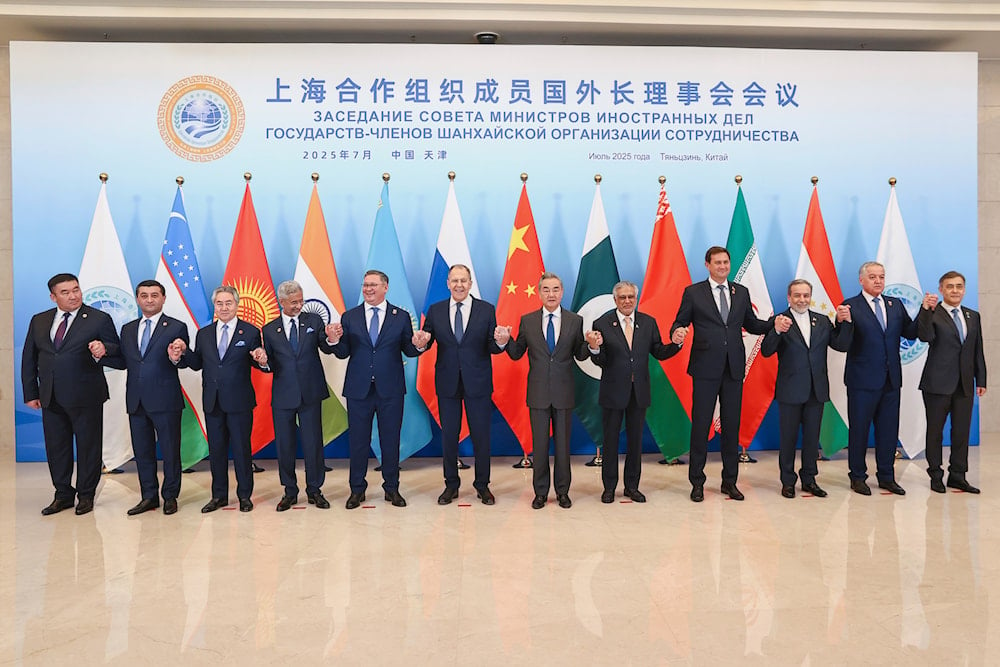Over 20 world leaders to join SCO summit in Tianjin
The Tianjin SCO summit will highlight achievements, set future goals, and strengthen partnerships among member states and dialogue partners across Eurasia.
-

Russian Foreign Minister Sergey Lavrov, center left, and Chinese Foreign Minister Wang Yi, center right, pose for a photo with other officials during the meeting on the Council of Foreign Ministers of the Shanghai Cooperation Organization (SCO), in Tianjin, China, July 15, 2025. (Russian Foreign Ministry Press Service via AP)
More than 20 foreign leaders, along with representatives from international organizations, are set to attend the Shanghai Cooperation Organization (SCO) summit in Tianjin from August 31 to September 1, Chinese Assistant Foreign Minister Liu Bin announced on Friday.
“Chinese President Xi Jinping will meet with over 20 foreign leaders and 10 heads of international organizations on the banks of the Haihe River,” Liu said during a briefing.
The invited dignitaries include Russian President Vladimir Putin, Belarusian President Alexander Lukashenko, Indian Prime Minister Narendra Modi, Iranian President Masoud Pezeshkian, Kazakh President Kassym-Jomart Tokayev, Kyrgyz President Sadyr Japarov, Pakistani Prime Minister Shehbaz Sharif, Tajik President Emomali Rahmon, Uzbek President Shavkat Mirziyoyev, Mongolian President Ukhnaagiin Khurelsukh, Azerbaijani President Ilham Aliyev, Armenian Prime Minister Nikol Pashinyan, Cambodian Prime Minister Hun Manet, Maldivian President Mohamed Muizzu, Nepalese Prime Minister Sharma Oli, Turkish President Recep Tayyip Erdogan, Egyptian Prime Minister Mostafa Madbouly, Turkmen President Serdar Berdimuhamedow, Indonesian President Prabowo Subianto, Laotian President Thongloun Sisoulith, Malaysian Prime Minister Anwar Ibrahim, and Vietnamese Prime Minister Pham Minh Chinh.
Agenda: Reviewing achievements and future plans
Liu noted that the summit will provide an opportunity for leaders to evaluate the SCO’s accomplishments, discuss its strategic direction, reach agreements on cooperation under the SCO framework, and advance the organization’s objective of fostering a closer, more integrated community of shared interests.
Founded in 2001, the SCO is a regional international organization that includes India, Iran, Kazakhstan, China, Kyrgyzstan, Russia, Tajikistan, Pakistan, and Uzbekistan. Belarus became a full member on July 4, 2024, at the Astana summit.
Observer countries include Afghanistan and Mongolia, while SCO dialogue partners encompass Azerbaijan, Armenia, Bahrain, Egypt, Cambodia, Qatar, Kuwait, Maldives, Myanmar, Nepal, the United Arab Emirates, Saudi Arabia, Turkey, and Sri Lanka.
Modi to visit China for first time since 2018 to attend SCO summit
Indian Prime Minister Narendra Modi is preparing to travel to China later this month, National Security Advisor Ajit Doval confirmed on Tuesday during discussions in New Delhi with Chinese Foreign Minister Wang Yi.
Doval said Modi will take part in the Shanghai Cooperation Organization summit, scheduled to open on August 31 in Tianjin, marking the Indian leader's first visit to China since 2018. "Our prime minister will be visiting for the SCO summit," Doval stated, noting what he described as "new energy" in bilateral relations.
For his part, Wang Yi expressed Beijing's expectations for the trip. According to an official translator, Wang said China "attaches great importance" to Modi's participation in the SCO gathering. "History and reality proves once again that a healthy and stable China-India relationship serves the fundamental and long term interests of both of our countries."
Wang was also scheduled to meet Modi directly later in the day.
Strategic rivalry
The visit comes against a difficult backdrop. India and China remain fierce competitors for influence across South Asia. Relations soured dramatically after the 2020 Galwan Valley clash, when troops on both sides were killed in the most violent border confrontation in decades. Although several rounds of corps-commander talks have since achieved limited disengagement, the Line of Actual Control remains unsettled, with tens of thousands of soldiers still deployed in forward areas.
Meanwhile, New Delhi has tightened its economic stance toward Beijing, banning dozens of Chinese apps and imposing restrictions on investment flows under the Press Note 3 FDI rule, which requires government screening for investments from countries sharing a land border with India. These measures remain in place, reflecting how security concerns continue to dominate the relationship.
Economic pressure
Despite tensions, trade between the two Asian giants has remained significant. Now, global turbulence has created fresh incentives to recalibrate ties. The US tariff wars under President Donald Trump, revived again in 2025, have disrupted supply chains and pressured both countries to hedge. For India, which is seeking to expand its export base, and for China, which faces mounting restrictions from Washington, selective cooperation offers a way to offset external shocks.
India's role in the Quad alliance with the United States, Australia, and Japan positions it firmly within a network often described as countering Beijing's rise. Yet forums like the SCO give New Delhi room to balance, engage, and explore pragmatic avenues with China. During talks on Monday with India's External Affairs Minister Subrahmanyam Jaishankar, Wang Yi suggested both sides reframe their approach: the two nations, he said, should "view each other as partners and opportunities, rather than adversaries or threats."
Analysts expect Modi's participation in Tianjin to focus less on dramatic breakthroughs and more on symbolic signaling. Possible areas of discussion include confidence-building steps along the border, trade facilitation in critical inputs, and coordination within the SCO framework.
Read more: India calls for lasting resolution to China border row at SCO summit

 5 Min Read
5 Min Read









